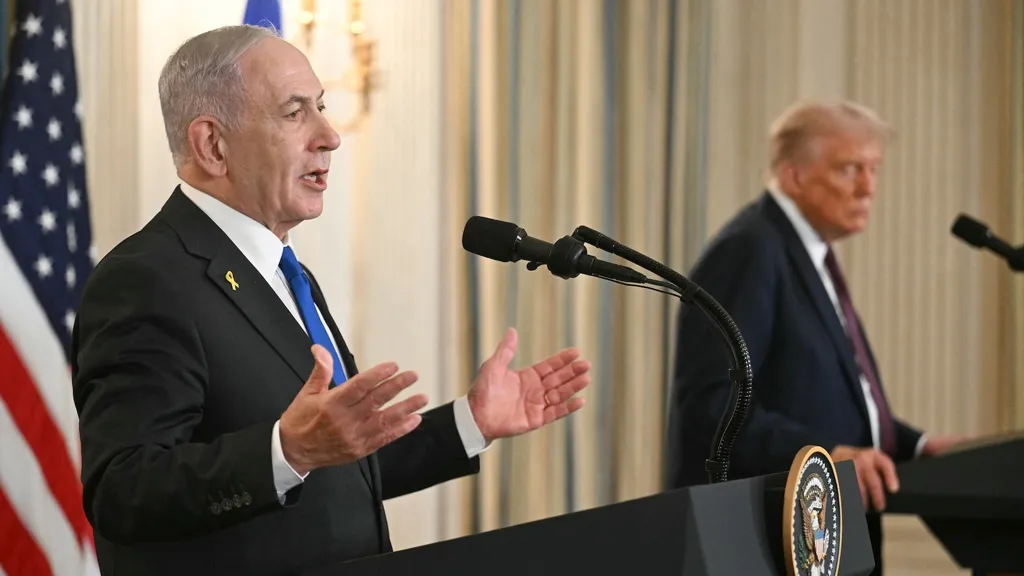Trump now says Hamas has until Sunday to sign off or "all HELL" will break out.
Time is running out for Hamas to accept a 20-point proposal for ending the war in Gaza or face severe consequences, according to an ultimatum set by President Donald Trump -- the plan's chief architect.
"An Agreement must be reached with Hamas by Sunday Evening at SIX (6) P.M., Washington, D.C. time. Every Country has signed on! If this LAST CHANCE agreement is not reached, all HELL, like no one has ever seen before, will break out against Hamas," Trump announced via Truth Social on Friday.
"THERE WILL BE PEACE IN THE MIDDLE EAST ONE WAY OR THE OTHER," he added.
The new deadline is a slight extension from the timeline he set on Tuesday after proposing the plan on Monday, when he said he would give the militant group "about three or four days."
Despite his threat, White House press secretary Karoline Leavitt told reporters on Thursday that the Trump administration had not received a response from Hamas.
"The president made it very clear he wants to hear back from them very soon," Leavitt said.
"We expect it and we hope that Hamas will accept the plan that was proposed," she added. "It's a good plan, and as you know, it's been applauded by leaders all over the world."
Despite some global leaders' misgivings about some of the plan's details, including ambiguity over the future of an independent Palestinian state, Leavitt is correct in her assertion that the proposal has garnered widespread support, including from Arab countries that would be key to the plan's implementation.
"The Trump plan has the backing of virtually all major regional governments and the major Islamic states of the world other than Iran. The EU [European Union] and its members also support it," said Marc Weller, chair of International Law and International Constitutional Studies at the University of Cambridge and a senior research fellow at Chatham House.
"There even seem to be Arab states willing to contribute armed stabilization forces - a potentially dangerous role that had previously not attracted many takers," Weller, who is also a former United Nations senior mediation expert, added.
The number of pieces falling together has put considerable pressure on Hamas to accept the proposal or risk its standing in Middle Eastern countries like Qatar that play host to its political leaders, allowing the group to negotiate with the outside world.
But accepting the terms of the deal also involves accepting considerable existential threats to the group's future, Weller says.
"The plan calls for Hamas to accept its own dissolution as both a military force and a civil administration," he explained. "In other instances, demobilization, collection of arms and reintegration of fighters would be a multi-year venture. Here, quite rapid action is expected, with no infrastructure specified other than a reference to 'independent monitors'."
As Hamas faces pressure from world leaders who support the plan, the group is also feeling pressure from Israel's military assault on Gaza City, which has intensified in the days following the unveiling of Trump's peace plan.
In the past, Trump has often shifted his deadlines when it comes to international negotiations, giving countries extra time to cut a trade deal or electing to give Moscow breathing room for talks aimed at ending the war in Ukraine.
On the flip side, the president has also appeared to move up deadlines on occasion. In June, he said he would give himself two weeks to decide on whether to attack Iran. Just days later, he ordered U.S. B-2 stealth bombers to strike the country's key nuclear sites.
But in this case, U.S. officials told ABC News on Thursday that they expected Trump to more or less stick to the timetable he set.
A key reason, they said, was that it wasn't solely the president's prerogative -- negotiators also need to keep Israeli Prime Minister Benjamin Netanyahu on board to move forward.
It took considerable pressure to get Netanyahu -- who is already facing backlash from the far-right members of his coalition in Israel -- to agree to terms of the proposal, and any further delay risks the loss of necessary momentum, the officials said.
Mediators have been pushing Hamas to accept, or -- at the very least -- issue a positive response to the plan, one official familiar with the negotiations said.
However, the official added that one intermediary -- Qatar -- had indicated to the Trump administration that Hamas may need additional time.
Aaron Goren, an analyst and editor at the Foundation for Defense of Democracies, argues that Trump holding firm on his timeline is paramount.
"The United States should not allow Hamas to shift the goalposts, seeking further concessions from Israel," he said. "Additionally, Qatari, Turkish, and Egyptian mediators should convey to Hamas that it is unlikely that there will be a better diplomatic off-ramp, especially one that gives the group's leaders amnesty abroad, as this one does."
Trump already has vowed that if Hamas rejects the plan, Netanyahu will have his unfettered support to continue his military campaign in Gaza.
"Israel would have my full backing to finish the job of destroying the threat of Hamas," Trump said standing beside the prime minister on Monday.
